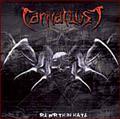TOXIC VIRGIN (de) - Sulphur (2004)

Label : Auto-Production
Sortie du Scud : février 2004
Pays : Allemagne
Genre : Hard Rock mélodique
Type : Album
Playtime : 12 Titres - 46 Mins
A l’écoute de ce quatrième album autoproduit des Allemands on a du mal à comprendre qu’ils n’aient pas été signé sur le label MTM. En effet TOXIC VIRGIN pratique un Hard Rock mélodique assez convenu, puisant son inspiration dans les années 80/90 et, bien que l’on sache que ce genre n’est plus porteur depuis un certain temps, on ne peut s’empêcher de penser qu’on a entendu pire bien des fois ! Car, même si l’on atteint rarement des sommets, l’ensemble est plutôt bien foutu. Le groupe s’emploie à alterner les ambiances afin de donner un maximum de variété à cet album et c’est assez réussi. La base musicale est un Hard Rock mélodique que l’on retrouve sur plusieurs titres mais qui sait prendre différents aspects : on commence avec “Evil Days” qui s’apparente à leurs compatriotes de SHYLOCK, puis on embraye avec le Power Metal mélodique sur “Born To Run”, le Heavy old school de “It Smells Of Leather”, en passant par le Hard Rock teinté de Folk sur “The Clown”, le Glam de “Mad As Hell” et “Whiskey A Gogo”, la ballade “We’ll Make It Through” puis on termine sur une chanson à boire dans le plus pur style teuton : “Girls Don’t Drink”.
Malgré ces différents changements d’ambiance, Sulphur conserve sa cohérence et il s’écoute agréablement à condition d’apprécier le Hard Rock mélodique du début de années 90.
La production n’est pas extraordinaire, elle a tendance a crachouiller un peu. C’est dommage car du côté des arrangements, TOXIC VIRGIN n’a rien à envier aux pros.
Ajouté : Jeudi 12 Janvier 2006
Chroniqueur : Alexis de Fireball
Score :   
Lien en relation: Toxic Virgin Website
Hits: 14281
|













